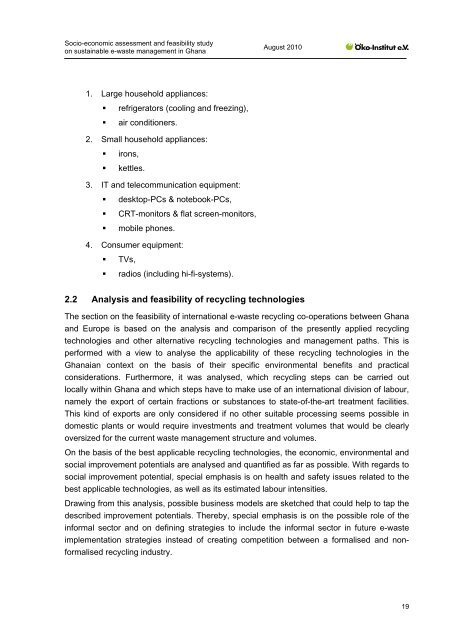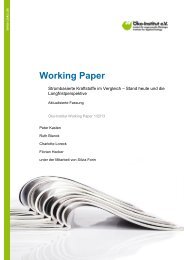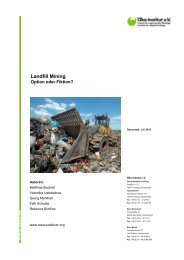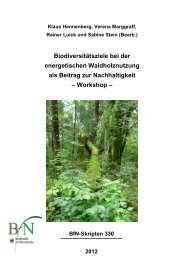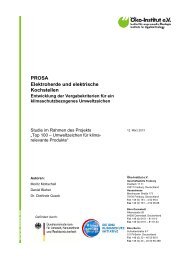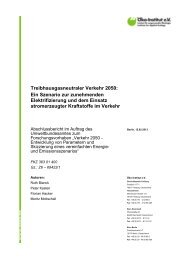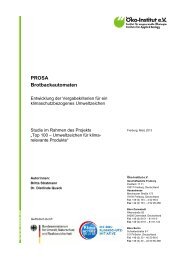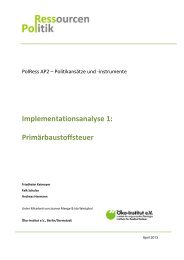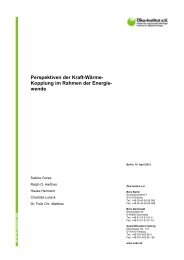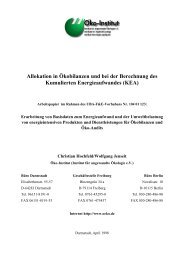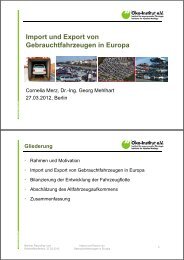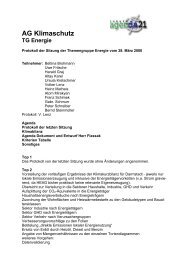Socio-economic assessment and feasibility study on - Öko-Institut eV
Socio-economic assessment and feasibility study on - Öko-Institut eV
Socio-economic assessment and feasibility study on - Öko-Institut eV
You also want an ePaper? Increase the reach of your titles
YUMPU automatically turns print PDFs into web optimized ePapers that Google loves.
<str<strong>on</strong>g>Socio</str<strong>on</strong>g>-<str<strong>on</strong>g>ec<strong>on</strong>omic</str<strong>on</strong>g> <str<strong>on</strong>g>assessment</str<strong>on</strong>g> <str<strong>on</strong>g>and</str<strong>on</strong>g> <str<strong>on</strong>g>feasibility</str<strong>on</strong>g> <str<strong>on</strong>g>study</str<strong>on</strong>g><br />
<strong>on</strong> sustainable e-waste management in Ghana<br />
1. Large household appliances:<br />
� refrigerators (cooling <str<strong>on</strong>g>and</str<strong>on</strong>g> freezing),<br />
� air c<strong>on</strong>diti<strong>on</strong>ers.<br />
2. Small household appliances:<br />
� ir<strong>on</strong>s,<br />
� kettles.<br />
3. IT <str<strong>on</strong>g>and</str<strong>on</strong>g> telecommunicati<strong>on</strong> equipment:<br />
� desktop-PCs & notebook-PCs,<br />
� CRT-m<strong>on</strong>itors & flat screen-m<strong>on</strong>itors,<br />
� mobile ph<strong>on</strong>es.<br />
4. C<strong>on</strong>sumer equipment:<br />
� TVs,<br />
� radios (including hi-fi-systems).<br />
August 2010<br />
2.2 Analysis <str<strong>on</strong>g>and</str<strong>on</strong>g> <str<strong>on</strong>g>feasibility</str<strong>on</strong>g> of recycling technologies<br />
The secti<strong>on</strong> <strong>on</strong> the <str<strong>on</strong>g>feasibility</str<strong>on</strong>g> of internati<strong>on</strong>al e-waste recycling co-operati<strong>on</strong>s between Ghana<br />
<str<strong>on</strong>g>and</str<strong>on</strong>g> Europe is based <strong>on</strong> the analysis <str<strong>on</strong>g>and</str<strong>on</strong>g> comparis<strong>on</strong> of the presently applied recycling<br />
technologies <str<strong>on</strong>g>and</str<strong>on</strong>g> other alternative recycling technologies <str<strong>on</strong>g>and</str<strong>on</strong>g> management paths. This is<br />
performed with a view to analyse the applicability of these recycling technologies in the<br />
Ghanaian c<strong>on</strong>text <strong>on</strong> the basis of their specific envir<strong>on</strong>mental benefits <str<strong>on</strong>g>and</str<strong>on</strong>g> practical<br />
c<strong>on</strong>siderati<strong>on</strong>s. Furthermore, it was analysed, which recycling steps can be carried out<br />
locally within Ghana <str<strong>on</strong>g>and</str<strong>on</strong>g> which steps have to make use of an internati<strong>on</strong>al divisi<strong>on</strong> of labour,<br />
namely the export of certain fracti<strong>on</strong>s or substances to state-of-the-art treatment facilities.<br />
This kind of exports are <strong>on</strong>ly c<strong>on</strong>sidered if no other suitable processing seems possible in<br />
domestic plants or would require investments <str<strong>on</strong>g>and</str<strong>on</strong>g> treatment volumes that would be clearly<br />
oversized for the current waste management structure <str<strong>on</strong>g>and</str<strong>on</strong>g> volumes.<br />
On the basis of the best applicable recycling technologies, the <str<strong>on</strong>g>ec<strong>on</strong>omic</str<strong>on</strong>g>, envir<strong>on</strong>mental <str<strong>on</strong>g>and</str<strong>on</strong>g><br />
social improvement potentials are analysed <str<strong>on</strong>g>and</str<strong>on</strong>g> quantified as far as possible. With regards to<br />
social improvement potential, special emphasis is <strong>on</strong> health <str<strong>on</strong>g>and</str<strong>on</strong>g> safety issues related to the<br />
best applicable technologies, as well as its estimated labour intensities.<br />
Drawing from this analysis, possible business models are sketched that could help to tap the<br />
described improvement potentials. Thereby, special emphasis is <strong>on</strong> the possible role of the<br />
informal sector <str<strong>on</strong>g>and</str<strong>on</strong>g> <strong>on</strong> defining strategies to include the informal sector in future e-waste<br />
implementati<strong>on</strong> strategies instead of creating competiti<strong>on</strong> between a formalised <str<strong>on</strong>g>and</str<strong>on</strong>g> n<strong>on</strong>formalised<br />
recycling industry.<br />
19


